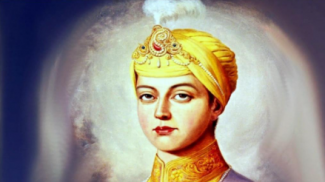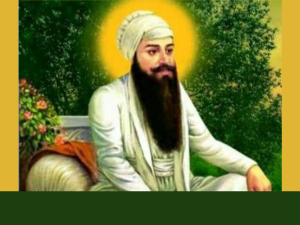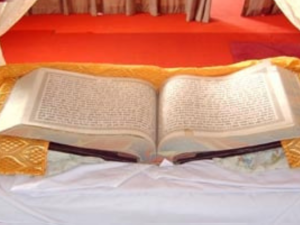Guru Har Krishan Ji (7 July 1656 – 30 March 1664) was the eighth of the ten Gurus of Sikhism. He became Guru on 7 October 1661, at the age of 5 years and 3 months after the death of his father, Guru Har Rai Ji. He is also called a ‘Bal Guru’ or the ‘Child saint’ as he attained Guruship, at a very young age.
Guru Har Krishan was born at Kiratpur, as the younger son of Guru Har Rai and Mata Krishen Devi (Mata Sulakhni). The name of the elder son of Guru Har Rai was ‘Baba Ram Rai.’
Aurangzeb came to succession of the Mughal Empire in 1658, and he summoned Guru Har Rai to Delhi in 1660. --Guru Har Rai instead sent his elder son Baba Ram Rai to represent him. Aurangzeb kept the 13-year-old Ram Rai as a hostage and questioned him about some verses in the ‘Adi Granth,’ which is the holy Granth of Sikhs.
Verses (bani) of Adi Granth:
ਗਰੀਬਾ ਉਪਰਿ ਜਿ ਖਿੰਜੈ ਦਾੜੀ ॥
गरीबा उपरि जि खिंजै दाड़ी ॥
The bearded emperor who struck down the poor.
ਗਉੜੀ (ਮਃ ੫) (੧੬੭) ੧:੧ - ਗੁਰੂ ਗ੍ਰੰਥ ਸਾਹਿਬ : ਅੰਗ ੧੯੯ ਪੰ. ੧੧
Raag Gauri Guru Arjan Dev --- (Ang 199 of 1430-- Sri Guru Granth Sahib)
ਪਾਰਬ੍ਰਹਮਿ ਸਾ ਅਗਨਿ ਮਹਿ ਸਾੜੀ ॥੧॥
पारब्रहमि सा अगनि महि साड़ी ॥१॥
Has been burnt in the fire by the Supreme Lord God. ||1||
ਗਉੜੀ (ਮਃ ੫) (੧੬੭) ੧:੨ - ਗੁਰੂ ਗ੍ਰੰਥ ਸਾਹਿਬ : ਅੰਗ ੧੯੯ ਪੰ. ੧੧
Raag Gauri Guru Arjan Dev Ji (Ang 199 of 1430 Sri Guru Granth Sahib)
Emperor Aurangzeb felt that it disparaged and defamed the Islam religion. Baba Ram Rai changed the verses to appease Emperor Aurangzeb, rather than defending and justifying the ‘bani’ verses.
Guru Har Rai (also spelled as Hari Rai) was ashamed and outraged with this act of his elder son. -- Guru Har Rai excommunicated and expelled his elder son Ram Rai from his family. He nominated his younger son ‘Har Krishan’ to succeed him as the next Guru of Sikhism.
Aurangzeb, meanwhile rewarded Ram Rai, patronizing him with land grants in Dehra Dun region of Uttarakhand, India, as he wanted to create a rift and quarrel between the two brothers.
Dr. Hari Ram Gupta writes in his book, ‘History of the Sikhs’: “After Guru Har Krishan had become the eighth Guru, Aurangzeb summoned the young Guru to his court. Raja Jai Singh humbly requested the Guru to come to Delhi, and assured him that he will make all arrangements of the Guru’s stay at Delhi. -- Guru Har Krishan undertook the journey to Delhi via Ambala in Punjab.
One of the famous Gurdwara of the Sikhs in North India is Gurdwara Bangla Sahib which at that time was the residence of Mirza Raja Jai Singh. The Guru stayed with Raja Jai Singh.”
It was during his stay here in the year 1664, that a deadly disease of smallpox and cholera had spread in the city of Delhi. The Guru himself was afflicted with smallpox and developed a high fever. He was shifted to another house near the Yamuna river to recuperate.
Guru Har Krishan was in a state of delirium due to high fever. As per the tradition he was required to nominate his next successor, before his death. On his deathbed, Guru Har Krishan blurted out, “Baba Bakale,” and died. -- It was 30 March, 1664.
The Sikh religious leaders interpreted these words to mean that the next Guru is to be found in the village ‘Bakale.’-- They identified the next Guru to be Guru Tegh Bahadur, who was his grand-uncle and was living in the village ‘Bakale.’ Guru Teg Bahadur thereafter became the ninth Guru of the Sikhs.
Gurdwara Bangla Sahib is one of the most prominent Sikh Gurdwaras or Sikh house of worship, in Delhi, India, and is known for its association with Guru Har Krishan, the eighth Sikh Guru. The holy pond inside its complex is known as the “Sarovar.”
One famous incident of Guru Har Krishan was recorded by the British administrator and historian Macauliffe (11 Sep 1838-15 March 1913) during the British rule in India, in his book Sikh Religion--Vol 4 from the life of Guru Har Krishan.
While on the way to Delhi from Punjab, Guru Har Krishan Ji stayed at Panjokhara, near present day Ambala. A Gurudwara by the name of ‘Panjokhra Sahib’ is situated at this place now.
A learned Pandit by the name of Lal Chand, noting that the Guru's name was similar to that of Lord Krishna, came visiting with the intent to test him on his knowledge of Bhagavad Gita by asking the meaning of a few shalokas. The Guru, with the intention to cure him of his pride, said that Lal Chand did not need a Guru for this task and that anyone could do that.
On hearing this, Lal Chand brought a mute and ignorant water carrier named Chhajju. The Guru placed his stick on Chhajju's head.
Macauliffe writes: “The Brahmin and the water carrier Chhajju accordingly began to discuss, and the water carrier gave such learned replies, that the Brahmin stood in astonished silence before the Guru.” -- He accordingly begged Guru Har Krishan's pardon for his mistake and became the Guru's disciple.
The above incident is an example of Guru Har Krishan’s wisdom to give the message that a saint is same sighted everywhere and treats all human beings as equal, whether one is a learned Pandit or an illiterate person.
Authentic literature with more details about Guru Har Krishan's life and times are scarce and not well recorded. Everything at that time was hand-written on palm-leaf manuscripts, and there was no printing press during the time period of Guru Har Krishan Ji.
Guru Har Krishan Ji did not write any bani verses of his own in the Adi Granth, but he had learnt the ‘bani’ verses of the previous Gurus and bhakats in the Adi Granth, and Sanskrit language under the tutelage of his father Guru Har Rai at a very young age.
Guru Nanak said that one should not search for God far away but perceive and acknowledge the consciousness of God in every living heart. God is very far away, yet very near.
ਸਚੜਾ ਦੂਰਿ ਨ ਭਾਲੀਐ ਘਟਿ ਘਟਿ ਸਬਦੁ ਪਛਾਣੋਵਾ ॥
सचड़ा दूरि न भालीऐ घटि घटि सबदु पछाणोवा ॥
Do not search for the True Lord far away; recognize the Word of the Shabad in each and every heart.
ਵਡਹੰਸ ਅਲਾਹਣੀਆ (ਮਃ ੧) (੪) ੧:੨ - ਗੁਰੂ ਗ੍ਰੰਥ ਸਾਹਿਬ : ਅੰਗ ੫੮੧ ਪੰ. ੫
Raag Vadhans Guru Nanak Dev (Ang 581 of 1439 Sri Guru Granth Sahib)
Teaching of Bhagavad Gita in the context of a learned Pandit:
Sri Krishna says to Arjuna:
An enlightened person, by perceiving the same spirit of God in all; looks with equal vision and is same-sighted on a humble learned priest; a cow; an elephant; a dog; and an outcaste member of the society; they being expressions of the same infinite Spirit of God. (Book: Word of God Bhagavad Gita: Chapter 5 verse 18)
विद्याविनयसंपन्ने ब्राह्मणे गवि हस्तिनि।
शुनि चैव श्वपाके च पण्डिताः समदर्शिनः।। (5:18)Transliteration from Sanskrit to English...“Vidya...vinaya...sampanne:---one who is endowed with learning and humility; brahmane:---man of Self-knowledge; gavi:---a cow; hastini:---an elephant; shuni:---a dog; cha:---and; eva:---even; shvapake:---an outcaste; cha:---and; panditah:---a sage or an enlightened person; sama...darshinah:---with equal vision.”
In the Sanskrit language a ‘Brahmin’ or a ‘Pandit’ is an ordinary temple priest who is entrusted to carry out the various duties and worship in a temple with the knowledge of the scriptures.
The word ‘Brahmana’ or ‘Panditah’ as referred in the above Bhagavad Gita verse pertains to an enlightened saint who has attained the final stage of God-realisation. It is indeed a rare thing to find a living God-realized person, and it is akin to looking for a needle in a hay stack.
An enlightened saint may be dwelling in a cave in the Himalayas, as he has reached the final goal of God-realisation, and will shun any publicity or human interactions, as he has conquered lust, anger, greed and ego, and there is nothing more for him to gain in the world.
The above verse says that the same Spirit of God exists in all living beings whether they are human beings, animals, birds, or underwater creatures in the sea. All life is sustained and is possible because of the presence of ‘soul’ within living beings. Human beings are the highest in the ladder of evolution, as they have the capacity to think and an intellect to distinguish between right and wrong.
God created mankind in his own image. Animal kingdom and other living creatures are lower in hierarchy of evolution, and they function by the instinct for survival and propagation of their own species, and are subservient to human beings.
The sameness of the Spirit of God is perceived in all by the enlightened saint, whether one is a Brahmin priest, an out-caste Sudra member of society, a cow, a dog or an elephant. One has to be compassionate towards all living beings and creatures and perceive the sameness of spirit in all.
Bible (Genesis 1:26) says, “Then God said, Let Us make man in Our image, according to Our likeness; and let them rule over the fish of the sea and over the birds of the sky and over the cattle and over all the earth, and over every creeping thing that creeps on the earth.”
Lord Sri Krishna was a cowherd boy in childhood, and he used to take his herd of cows to graze in the fields. Sri Krishna used to call his cows with lovely music on his flute and the cows will respond by gathering around him and listen to his music with love and affection.
Overwhelmed by the affection, Lord Sri Krishna would pat and caress the cows with his hands. Similarly, the owner of a pet dog will lovingly feed and caress his or her dog. The mahout of an elephant will take care of his elephant and shower his affection and love.
This is known as having an equal vision for all living beings with love and compassion for all. The Spirit of God resides in all creatures and the life of everyone is precious.
Having an equal vision and being same sighted on all living beings implies that there is no ego inside you and that you are not superior to others. We are simply a part of the same existence.
The ego in human beings creates different categories and we think that we are someone special. The existence needs everything to make it whole.
Guru Nanak, the founder of Sikhism propagated the same concept of equality in all living beings and instituted the tradition of eating langar food while seated on the floor whether one is rich or poor. To create equality, Guru Nanak abolished all caste system, and all male members use ‘Singh’ as the surname, and females use ‘Kaur.’
Sikhism abolished idol worship, performance of all rituals and the concept of polytheism or many gods and deities as in Hinduism. Sikhism does not include worship in Kaaba or Mecca or observing a period of one month fasting in Ramadan. Muslims religion is also monotheistic and believes in one God as Allah, but with its own guiding tenets of Quran scripture.
Sikhism believes in one God as ‘Wahe Guru’ or Ek-Omkar, timeless, eternal and Karta Purukh.—‘Wahe Guru’ is a name which includes Allah, Brahma, Vishnu, Mahesh, Sri Ram, Sri Krishna, Jesus Christ, Moses, and all other gods.
The word ‘Wahe Guru’ is all encompassing and includes everything in the universe. Sikhism is a distinct religion of its own with its own guiding pillars and scripture.
Gurbani verses:
ਭੁਖਿਆ ਭੁਖ ਨ ਉਤਰੀ ਜੇ ਬੰਨਾ ਪੁਰੀਆ ਭਾਰ ॥
भुखिआ भुख न उतरी जे बंना पुरीआ भार ॥
The hunger of the hungry is not appeased, even by piling up loads of worldly goods.
ਜਪੁ (ਮਃ ੧) ੧:੩ - ਗੁਰੂ ਗ੍ਰੰਥ ਸਾਹਿਬ : ਅੰਗ ੧ ਪੰ. ੫
Jap Guru Nanak Dev (Ang 1 of 1430 Sri Guru Granth Sahib)
ਦੇਦਾ ਦੇ ਲੈਦੇ ਥਕਿ ਪਾਹਿ ॥
देदा दे लैदे थकि पाहि ॥
The Great Giver keeps on giving, while those who receive grow weary of receiving.
ਜਪੁ (ਮਃ ੧) ੩:੧੧ - ਗੁਰੂ ਗ੍ਰੰਥ ਸਾਹਿਬ : ਅੰਗ ੨ ਪੰ. ੨
Jap Guru Nanak Dev (Ang 2 of 1430 Sri Guru Granth Sahib)
ਧੰਧਾ ਰੋਵੈ ਮੈਲੁ ਨ ਧੋਵੈ ਸੁਪਨੰਤਰੁ ਸੰਸਾਰੋ ॥
धंधा रोवै मैलु न धोवै सुपनंतरु संसारो ॥
They weep for the sake of worldly affairs, and they do not wash off their own filth; the world is merely a dream.
ਵਡਹੰਸ ਅਲਾਹਣੀਆ (ਮਃ ੧) (੪) ੪:੩ - ਗੁਰੂ ਗ੍ਰੰਥ ਸਾਹਿਬ : ਅੰਗ ੫੮੧ ਪੰ. ੧੫
Raag Vadhans Guru Nanak Dev ( Ang 581 of 1430 SGGS)
ਪਵਣੁ ਪਾਣੀ ਅਗਨਿ ਤਿਨਿ ਕੀਆ ਬ੍ਰਹਮਾ ਬਿਸਨੁ ਮਹੇਸ ਅਕਾਰ ॥
पवणु पाणी अगनि तिनि कीआ ब्रहमा बिसनु महेस अकार ॥
He created air, water and fire, Brahma, Vishnu and Shiva - the whole creation.
ਗੂਜਰੀ ਅਸਟ (੧) (੨) ੪:੧ - ਗੁਰੂ ਗ੍ਰੰਥ ਸਾਹਿਬ : ਅੰਗ ੫੦੪ ਪੰ. ੧
Raag Goojree Guru Nanak Dev (Ang 504 of 1430 Sri Guru Granth Sahib)
ਸਰਬੇ ਜਾਚਿਕ ਤੂੰ ਪ੍ਰਭੁ ਦਾਤਾ ਦਾਤਿ ਕਰੇ ਅਪੁਨੈ ਬੀਚਾਰ ॥੪॥
सरबे जाचिक तूं प्रभु दाता दाति करे अपुनै बीचार ॥४॥
All are beggars; You alone are the Great Giver, God. You give Your gifts according to Your own considerations. ||4||
ਗੂਜਰੀ ਅਸਟ (੧) (੨) ੪:੨ - ਗੁਰੂ ਗ੍ਰੰਥ ਸਾਹਿਬ : ਅੰਗ ੫੦੪ ਪੰ. ੨
Raag Goojree Guru Nanak Dev (Ang 504 of 1430 Sri Guru Granth Sahib)
Bani verse by Guru Arjan Dev Ji:
ਗੁਰਮੁਖਿ ਸੰਗੀ ਕ੍ਰਿਸਨ ਮੁਰਾਰੇ ॥
गुरमुखि संगी क्रिसन मुरारे ॥
The Lord Krishna becomes the Gurmukh's Companion.
ਮਾਝ (ਮਃ ੫) (੧੩) ੨:੨ - ਗੁਰੂ ਗ੍ਰੰਥ ਸਾਹਿਬ : ਅੰਗ ੯੮ ਪੰ. ੯
Raag Maajh Guru Arjan Dev (Ang 98 of 1430 Sri Guru Granth Sahib)
******************************************
References:
Online book references on the internet: History of the Sikhs (1469-1708) by Dr. Hari Ram Gupta
Word of God Bhagavad Gita by Ajay Gupta







